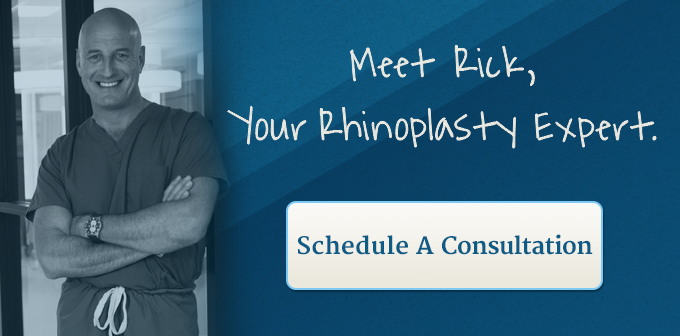Revision rhinoplasty has the potential to improve your life dramatically if you’ve had a less-than-stellar nose job in the past. Still, there are many challenges associated with this complex type of facial plastic surgery. To minimize your chances of complications when you undergo a revision rhinoplasty in NJ, be sure to choose an expert rhinoplasty surgeon.
Only an expert can safely and successfully correct your primary rhinoplasty. Perhaps the biggest risk going into a revision rhinoplasty is another disappointing result. Let’s look at that issue and other risks that are associated with secondary rhinoplasty. We’ll also provide some specific advice on how you can avoid unnecessary risk.
Let Your Past Experience Guide You to Revision Rhinoplasty Success
As a former rhinoplasty patient about to go through a second procedure to correct the first surgery, you likely feel pretty disappointed and frustrated. You may feel cheated or betrayed by the plastic surgeon who performed your first rhinoplasty.
You may also feel that it’s unfair that you have to go through a second rhinoplasty procedure. And you’re absolutely right! No one should have to repeat a rhinoplasty surgery to get a good result.
The only upside to having been through this before is that you can use that first experience to help ensure you won’t have the same bad result the second time around. This is not to say that you made errors the first time that contributed to your unsatisfactory rhinoplasty.
To Correct a Botched Nose Job, You Need a Better Rhinoplasty Surgeon
Some surgeons will try to place blame on the patient, saying that the patient was not sure what they wanted—or wanted some unrealistically perfect result from rhinoplasty. We feel that it is the surgeon’s responsibility to find out what the patient wants and determine what is needed. If what the patient wants is not possible, the surgeon has the responsibility to be honest and advise the patient to rethink their rhinoplasty goal.
Even if a patient insists on an unrealistic rhinoplasty goal, (wants a result that is not possible given their anatomy), the responsibility still falls on the expert surgeon. The NJ revision rhinoplasty surgeon must not go forward with a rhinoplasty—unless or until they and the patient agree on the goal for the nose job.
If the patient clings to an unrealistic goal, the surgeon has a duty not to go forward and not to perform the surgery. So this is why we firmly believe that there is no way you’re at fault. If a plastic surgeon hints that you are to blame in some way for a failed rhinoplasty, find another surgeon.
What Went Wrong with Your First Rhinoplasty?
The most feared risk associated with revision rhinoplasty, according to many patients seeking revision, is another failed attempt. Here are some of the main things that doom a rhinoplasty to failure, (whether it is a disastrous failure or just an underwhelming rhinoplasty result) and how to prevent the problem from happening with your revision rhinoplasty. Common errors include:
The surgeon didn’t have the listening skills, drive or desire to do what you asked.
Instead the primary rhinoplasty surgeon gave you the nose they thought was best, or the one that was simplest/quickest. Some surgeons don’t pay much attention to what the patient says. Some surgeons never ask questions about what the patient wants or what patients dislike about their nose. Others ask, but don’t really listen closely to your answers. Does this sound familiar? If so…
Here’s how to avoid this problem next time:
- Be sure to choose only a NJ revision rhinoplasty surgeon who seems genuinely interested and invested in your outcome.
- If you don’t feel the surgeon is paying attention in your consultation or you don’t feel that her or she is committed to doing their best for you – choose another surgeon.
- If your surgeon rushes your consultation or focuses only on costs or tries to get you to decide immediately whether to go forward, choose another surgeon.
The surgeon overestimated his or her skill level.
The surgeon may have done the best they could, and may have given you the only type of nasal surgery that they know how to do. It takes years of surgical experience in tough rhinoplasty cases, an avid interest in nasal surgery and an aptitude for rhinoplasty, in order to produce consistently successful results for your patients.
It also requires a keen sense of aesthetics to reshape a nose to the proper size and shape, while also balancing the other facial features for an attractive result. If your primary surgeon didn’t have superior surgical technique and excellent medical judgment, and decided to perform surgery anyway, you can end up with a bad rhinoplasty outcome. If this sounds familiar…
Here’s how to avoid this problem next time:
- Check out your surgeon’s background before meeting with them. This way you can save time and avoid consulting with someone who doesn’t meet the basic qualifications to handle your nose job. This is especially important in a revision rhinoplasty, which requires even more skill.
- Check the rhinoplasty surgeon’s licensure with the state of NJ Dept. of Consumer Affairs website.
- Check to see that the surgeon is board certified with the ABMS (American Board of Medical Specialties) in plastic Surgery and general surgery. Visit certificationmatters.org.
- Read the surgeon’s bio or CV and find out where they attended medical school. It should be a solid institution that you have heard of. You can check the school’s (and residency hospital’s) reputation online if you are unsure.
- Calculate how long the surgeon could have been in practice after completing their education. Then ask them how many years they’ve been in practice (performing rhinoplasty and revision rhinoplasty) when you meet, and make sure the math works out.
- Choose a surgeon with advanced skills such as a reconstructive plastic surgeon for your revision rhinoplasty, to reduce your risk of complications.
You were somewhat vague about what you wanted to change about your nose.
Your surgeon didn’t try to find out more and instead they just did what they thought best. If this sounds familiar…
Here’s how to avoid this problem next time:
- Make sure your surgeon asks you questions. You don’t have to be certain what needs to change about your nose when considering rhinoplasty or a revision. If you’re certain that something bothers you or distracts you from the rest of your life, that’s enough. An expert rhinoplasty surgeon in NJ can help you isolate what you are troubled by and propose a solution.
Your goal for your rhinoplasty was not a realistic one.
Instead of telling you it was unrealistic, your surgeon did something else. If this sounds familiar…
Here’s how to avoid this problem next time:
- Make sure your surgeon acknowledges your goal and seems to get it. Do you want a more refined and smaller tip? Do you want a straighter bridge? Are you concerned about your nose becoming too generic, too thin, too rounded or too anything?
- If your surgeon thinks that the changes you want will not look right with your other facial features, or will weaken your nose, or will make it hard to breathe – he or she should let you know. Your surgeon should then suggest a better option, if one exists. If your surgeon thinks you are not a good candidate for revision rhinoplasty, they should tell you and explain why.
- Don’t let this upset you, because you want and need to know if your surgeon doesn’t feel your goal is achievable. You are then free to accept their advice and/or choose another surgeon for another point of view.
- Make sure you understand how your surgeon plans to achieve your goal. The best rhinoplasty surgeons in NJ will explain their surgical strategy to you. Hearing about the plan will let you know what to expect, confirm that they have heard what your goal is and are working to achieve it, and increase your confidence in the surgeon.
- Make sure the surgeon seems honest. You should get a sense of whether you feel the surgeon is trustworthy, after talking with them. If you’re uncomfortable or in doubt at all, choose another surgeon.
Especially with a revision rhinoplasty, your possibilities for changing your nose may be limited due to prior damage, however, a revision rhinoplasty expert can often offer you significant improvement.
Revision Rhinoplasty Surgical Risks
- Excessive bleeding
- Infection
- Slow or incomplete wound healing
- Skin numbness, discoloration or loss
- Nasal septum perforation
- Breathing difficulties
- Excess scarring and scar tissue growth
- Insufficient residual nasal cartilage (not enough left to rebuild a stable nose)
- Need for additional cartilage (grafted from your ear or rib, for example)
- Anesthesia-related risks
- Unsuccessful outcome, unsatisfactory appearance
- Possibility of future revisional surgery, which involves more risk
- Other risks having to do with your physical condition or chronic medical conditions
Revision rhinoplasty carries more risk than primary surgery, but if a botched primary rhinoplasty is affecting your life—it’s worthwhile to look into a revision. Find a top rhinoplasty specialist to limit your surgical risk. When performed by an experienced rhinoplasty specialist with reconstructive experience, the success rate is high.
At Cohen/Winters Aesthetic & Reconstructive Surgery in Bergen County, NJ, we specialize in complex revision rhinoplasty. To see if you’re a good candidate and learn about your options for a corrective nose job, take advantage of our no-charge consultation offer. We’re ready to help, so contact us today.


